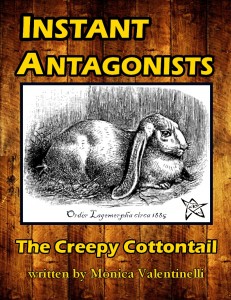I have a strange relationship with Lovecraft, because even though he’s all about “your mind can’t handle the horrible truth” I often obsess over think of all the things that could go wrong. What if the cultists were preventing Cthulhu from rising? What happens if the Necronomicon is read backward?
Or, as in this latest case of what-ifness… What happens if a particular Outer God screws up royally?
The latest addition to FR Press’s line of Instant Antagonists was born after I penned a particular sordid tale called “The Curse of the Yellow Rabbit.” I give you? The Creepy Cottontail. Incorporating reviews and feedback from the debut character in the series, you’ll find expanded content and plenty of systemless ways to infuse this horrible hare into your modern horror game.
Introducing a New Instant Antagonist

Description
INSTANT ANTAGONISTS are systemless creatures or beings designed for use in existing modern supernatural/horror games. Many will be supernatural in nature; some will be (at least nominally) human. While one antagonist may be truly evil, others are simply selfish, immoral or may even be victims themselves.
Looking for a new twist on an old legend or trope? This product is a perfect addition to a GM’s modern horror game collection. The INSTANT ANTAGONISTS line offers details on each monster’s origins, powers and plenty of story hooks to include them in your campaign or evening’s session.
The Creepy Cottontail
At first glance, Queenie looks like any other cottontail — but is he? Come a little closer and see for yourself why this nefarious hare has cultists (and non-cultists alike) running around in circles.
Is an Outer God really trapped inside the body of a fluffy bunny rabbit? Will he enslave the minds of pet store owners everywhere? Or will The Creepy Cottontail entice a small town’s population to turn on each other in a bloody fight to the finish?
The Creepy Cottontail is one creature you can’t fall asleep to forget…
Click here to check out The Creepy Cottontail on RPGNow.com
Written by Monica Valentinelli. Edited by Matt M McElroy.


